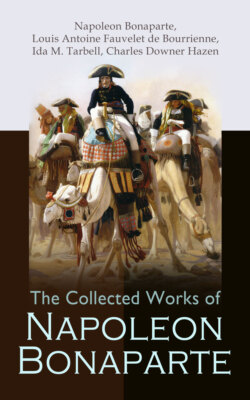Читать книгу The Collected Works of Napoleon Bonaparte - Charles Downer Hazen, Louis Antoine Fauvelet de Bourrienne - Страница 201
На сайте Литреса книга снята с продажи.
SERIES C
ОглавлениеTHE CAMPAIGN OF MARENGO, 1800
Elected to the joint consulate by the events of the 18th Brumaire (November 9), 1799, Napoleon spent the first Christmas Day after his return from Egypt in writing personal letters to the King of England and Emperor of Austria, with a view to peace. He asks King George how it is that the two most enlightened nations of Europe do not realise that peace is the chief need as well as the chief glory ... and concludes by asserting that the fate of all civilised nations is bound up in the conclusion of a war "which embraces the entire world." His efforts fail in both cases. On December 27th he makes the Moniteur the sole official journal. On February 7th, 1800, he orders ten days' military mourning for the death of Washington—that "great man who, like the French, had fought for equality and liberty." On April 22nd he urges Moreau to begin his campaign with the army of the Rhine, an order reiterated on April 24th through Carnot, again made Minister of War. A diversion to save the army of Italy was now imperative. On May 5th he congratulated Moreau on the battle of Stockach, but informs him that Massena's position is critical, shut up in Genoa, and with food only till May 25th. He advises Massena the same day that he leaves Paris that night to join the Army of Reserve, that the cherished child of victory must hold out as long as possible, at least until May 30th. At Geneva he met M. Necker. On May 14th he writes General Mortier, commandant of Paris, to keep that city quiet, as he will have still to be away a few days longer, which he trusts "will not be indifferent to M. de Mélas."
No. 3.
This letter was written from Ivrea, May 29th, 1800. On the 30th Napoleon is at Vercelli, on June 1st at Novara, and on June 2nd in Milan. Eugène served under Murat at the passage of the Ticino, May 31st.
M.'s; probably "Maman," i.e. his mother.
Cherries.—This fruit had already tender associations. Las Cases tells us that when Napoleon was only sixteen he met at Valence Mademoiselle du Colombier, who was not insensible to his merits. It was the first love of both.... "We were the most innocent creatures imaginable," the Emperor used to say; "we contrived little meetings together. I well remember one which took place on a midsummer morning, just as daylight began to dawn. It will scarcely be believed that all our happiness consisted in eating cherries together" (vol. i. 81, 1836).
No. 4.
Milan.—He arrived here on June 2nd, and met with a great reception. In his bulletin of June 5th we find him assisting at an improvised concert. It ends, somewhat quaintly for a bulletin, as follows: "Italian music has a charm ever new. The celebrated singers, Billington,50 La Grassini, and Marchesi are expected at Milan. They say they are about to start for Paris to give concerts there." According to M. Frédéric Masson, this Paris visit masked ulterior motives, and was arranged at a déjeûner on the same day, where La Grassini, Napoleon, and Berthier breakfasted together. Henceforward to Marengo Napoleon spends every spare day listening to the marvellous songstress, and as at Eylau, seven years later, runs great risks by admitting Venus into the camp of Mars. At St. Helena he declares that from June 3rd to 8th he was busy "receiving deputations, and showing himself to people assembled from all parts of Lombardy to see their liberator." The Austrians had declared that he had died in Egypt. The date of No. 4 should probably be June 9th, on which day the rain was very heavy. He reached Stradella the next day.
